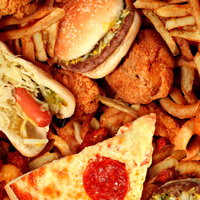 A new scholarly study has found a link between the consumption of fast food by young children to lower academic achievement. Students were tested in reading, mathematics, and science in fifth and eighth grade. The students consumption of fast food in fifth grade was also measured.
A new scholarly study has found a link between the consumption of fast food by young children to lower academic achievement. Students were tested in reading, mathematics, and science in fifth and eighth grade. The students consumption of fast food in fifth grade was also measured.
The results showed that students who had fast food four to six times per week showed significantly lower scores in all three categories. The results held true even when all other student characteristics – such as socioeconomic status, family status, exercise levels, and type of neighborhood and school – were the same.
Previous studies have shown that fast food lacks nutrients such as iron that is beneficial to cognitive development. Also, many fast foods are high in fat and sugar that can be detrimental to short-term memory and learning processes.
The relationship between fast food and academic success is of particular importance to African American families. A recent Gallup poll found that 52 percent of young African Americans eat fast food every week compared to 46 percent of non-Hispanic Whites.
Co-author Kelly Purtell, an assistant professor of human sciences at Ohio State University, stated that “there’s a lot of evidence that fast-food consumption is linked to childhood obesity, but the problems don’t end there. Relying on fast food could hurt how well children do in the classroom. We’re not saying that parents should never feed their children fast food, but these results suggest fast-food consumption should be limited as much as possible.”
The study, “Fast Food Consumption and Academic Growth in Late Childhood,” was published on the website of the journal Clinical Pediatrics. It may be accessed here.












Here’s another suspect study(Clinical Pediatrics and definitely the Gall Poll results) that uses the Black community as the research petri to solidify these half-truths about the Black students and academic performance. The majority of Fast Food chains are situated in the nation’s “inner-cities”, but, the suburbs, and exburbs. Also, the Gall Poll has no validity because of its historical and current racists practices towards the Black community.
In fact, Kelly Purtell, your study should have examined the “fast food” industry in an effort to hold them accountable for the toxic and cancer causing food they sell in this country. Further, I would suggest you conduct a study on why states that have an overwhelmingly majority White population (Maine, Vermont, Rhode Island, Oregon, or Colorado, etc.) and why they’re failing to meet AYP according to NCLB. In other words, what’s their excuse?